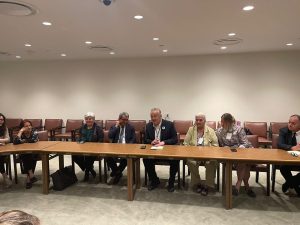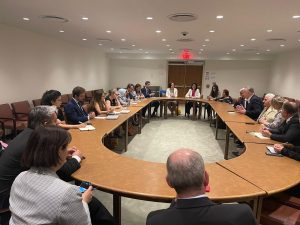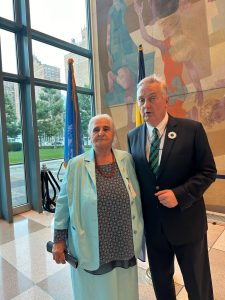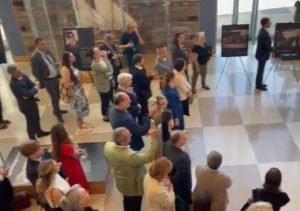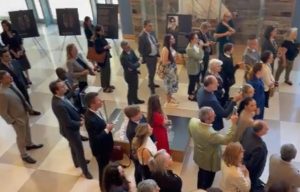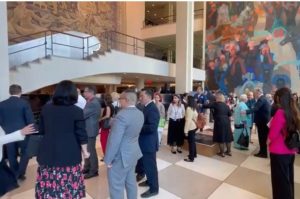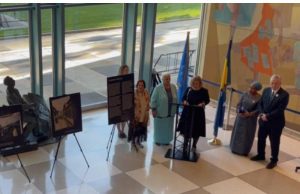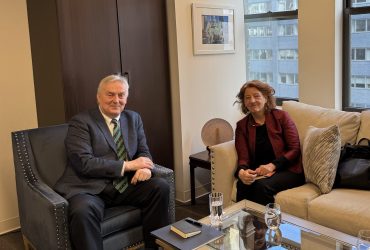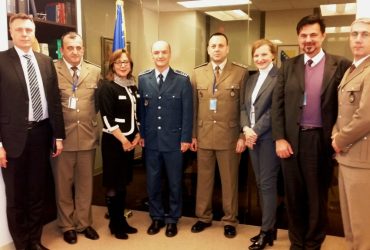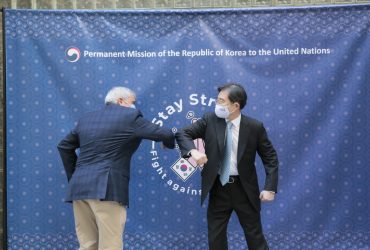United Nations Hosts Srebrenica Genocide Exhibition, Opening Ceremony Features Speech by Zlatko Lagumdzija
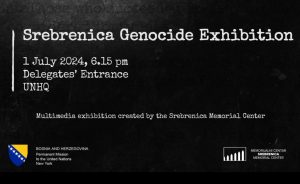 New York City, July 1, 2024 – The United Nations is currently hosting an exhibition commemorating the victims of the Srebrenica genocide, open from July 1 to July 12th. Organized by the Permanent Mission of Bosnia and Herzegovina, the exhibition serves as a testament to the ongoing mission of the Srebrenica-Potocari Memorial Center.
New York City, July 1, 2024 – The United Nations is currently hosting an exhibition commemorating the victims of the Srebrenica genocide, open from July 1 to July 12th. Organized by the Permanent Mission of Bosnia and Herzegovina, the exhibition serves as a testament to the ongoing mission of the Srebrenica-Potocari Memorial Center.
The exhibition was inaugurated on July 1st with an opening reception hosted by H.E. Dr. Zlatko Lagumdzija, Permanent Representative of Bosnia and Herzegovina to the United Nations. The exhibition was opened by Amra Begic, Deputy Director of the Srebrenica-Potocari Memorial Center (SMC) and Munira Subasic, leader of the Mothers of Srebrenica. They underscored the significance of the exhibition in preserving history and combatting ignorance and hatred, crucial elements in preventing future genocides.
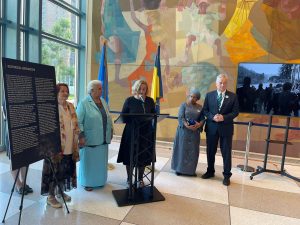 H.E. dr Zlatko Lagumdzija in his speech extended special thanks to key figures present, including Amra Begic, Deputy Director of the Srebrenica-Potocari Memorial Center (SMC), and Azir Osmanovic, curator and chief researcher of the exhibition, both of whom are survivors and contributors to the powerful multimedia display. Lagumdzija also acknowledged Munira Subasic, leader of the Mothers of Srebrenica, renowned for their unwavering dedication to truth, justice, and reconciliation.
H.E. dr Zlatko Lagumdzija in his speech extended special thanks to key figures present, including Amra Begic, Deputy Director of the Srebrenica-Potocari Memorial Center (SMC), and Azir Osmanovic, curator and chief researcher of the exhibition, both of whom are survivors and contributors to the powerful multimedia display. Lagumdzija also acknowledged Munira Subasic, leader of the Mothers of Srebrenica, renowned for their unwavering dedication to truth, justice, and reconciliation.
“Today, we recognize the invaluable support of Alice Nderitu, Special Advisor on the Prevention of Genocide, and Atul Khare, Under-Secretary-General of the UN, whose assistance has been pivotal in navigating the complexities of multilateral diplomacy,” Lagumdzija continued. He expressed gratitude to member states, led by Germany and Rwanda, for their initiative in establishing the Group of Friends of Commemoration and Resolution on the Srebrenica Genocide.
“This Exhibition marks the symbolic beginning of implementing the Resolution, leading up to the Remembering Srebrenica High-Level Commemorative Event on July 11, which will observe the International Day of Reflection and Commemoration of the Srebrenica Genocide for the first time at the UN,” Lagumdzija emphasized.
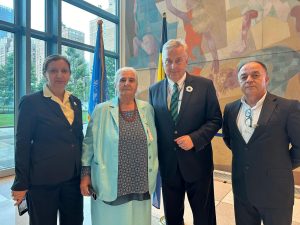 Reflecting on the journey to adopt the Srebrenica Genocide Resolution, Lagumdzija recognized the ongoing challenges in implementing it but stressed the exhibition’s role in promoting a culture of memorialization essential for genocide prevention, peace-building, and reconciliation.
Reflecting on the journey to adopt the Srebrenica Genocide Resolution, Lagumdzija recognized the ongoing challenges in implementing it but stressed the exhibition’s role in promoting a culture of memorialization essential for genocide prevention, peace-building, and reconciliation.
The Srebrenica Genocide Exhibition stands as a testament to resilience, remembrance, and the collective pursuit of justice, echoing a solemn pledge: Never Again, to no one, nowhere.
Established in 2000 under the auspices of the High Representative for Bosnia and Herzegovina, the Srebrenica-Potocari Memorial Center stands as a solemn remembrance for the victims of the 1995 genocide in Srebrenica. Central to its mission is the annual Day of Remembrance for the Victims of the Srebrenica genocide, observed each July 11th with a week-long program engaging global communities in honoring the victims.
Beyond commemoration, the Memorial Center actively engages in research, exhibitions, and initiatives aimed at increasing public awareness and combating genocide denial. Its ongoing efforts include collecting artifacts, recording survivor testimonies, and analyzing judicial proceedings related to establishing accountability for the crimes committed during the genocide.
For further information, please visit the Srebrenica-Potocari Memorial Center or explore their online resources.
THE SREBRENICA MEMORIAL CENTER
Srebrenica-Potocari Memorial Center for the Victims of the 1995 Genocide was established in 2000 by the decision of the High Representative for Bosnia and Herzegovina. A place of remembrance for the victims of the genocide in Srebrenica, the Memorial Center is dedicated to preserving history and combatting the forces of ignorance and hatred which make genocide possible. Central to the mission of the Memorial Center is the organization of the Day of Remembrance for the Victims of the Srebrenica genocide which takes place annually on July 11th. This commemoration includes a week-long program of activities and events which are designed to engage the local, national, and global communities in honoring the victims of the genocide in Srebrenica.
However, the work of the Memorial Center continues year-round, through research, projects, exhibitions, events, and publications intended to increase public awareness of the genocide as well as to commemorate its victims. Ongoing activities at the Memorial Center which exemplify this mission include: collecting personal artefacts of genocide; recording oral testimonies of genocide survivors; analyzing court verdicts and judicial proceedings relevant to establishing responsibility for the crimes committed during the genocide; combatting genocide denial; and raising global awareness about genocide and crimes against humanity with the goal of preventing their reoccurance in the future.
In fulfilling mission, Memorial Center in constant cooperation with partner organizations in Bosnia and Herzegovina, the wider region, and around the world. We remain extremely grateful to the institutions and individuals whose support for the activities of the Memorial Center demonstrate a shared commitment to our mission and values. These partnerships span the fields of art, journalism, academia, and media, allowing the message of Srebrenica to reach an ever-expanding audience through a diverse array of platforms and mediums. Likewise, we encourage all of those interesting in helping to preserve the truth of the Srebrenica genocide to visit the Memorial Center.
In its exhibitions, library, archive, and documentation center, researchers and practitioners alike will find an abundance of resources to assist them in their endeavors. In Bosnia and Herzegovina, the persistance of genocide denial as well as religious and ethnic intolerance remain enormous obstacles to peace and reconciliation. At the Srebrenica Memorial Center, recognize the immediate threat which these practices pose to the processes of transitional justice and peace-building. These same dynamics can be witnessed across the globe, where historical revisionism and ideologies of hatred continue to endanger marginalized communities and to corrode the very fabric of society. In all that Center is committed to a fact-based approach which promotes tolerance, dialogue, and collective healing.
